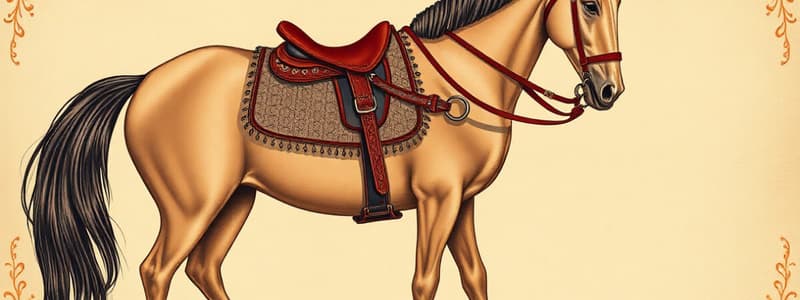Podcast
Questions and Answers
What does 'full rigging' refer to in saddle terminology?
What does 'full rigging' refer to in saddle terminology?
- Position of the D/O rings (correct)
- Type of leather used
- Connection of stirrup leathers
- Position of the saddle pads
Which is an advantage of synthetic saddles?
Which is an advantage of synthetic saddles?
- Better durability than leather
- Superior styling options
- Lightweight and easy care (correct)
- Heavier weight for better stability
Why is proper selection and fit of a saddle important?
Why is proper selection and fit of a saddle important?
- To make it easier to store the saddle
- To prevent soreness and injury to the horse and rider (correct)
- To ensure the saddle matches the rider's outfit
- To enhance the aesthetic appeal
What condition may indicate that your saddle gear is at risk of failure?
What condition may indicate that your saddle gear is at risk of failure?
Which piece of equipment should be inspected carefully due to its critical function?
Which piece of equipment should be inspected carefully due to its critical function?
What is the first step in the proper order for saddling a horse?
What is the first step in the proper order for saddling a horse?
How should the front cinch be secured?
How should the front cinch be secured?
What should be done every time the saddle is removed from the horse?
What should be done every time the saddle is removed from the horse?
What is the first step in the saddle selection process?
What is the first step in the saddle selection process?
Which of the following saddle types is associated with jumping?
Which of the following saddle types is associated with jumping?
What is an important consideration when fitting a saddle?
What is an important consideration when fitting a saddle?
What is the primary factor that determines whether a bit is mild or harsh?
What is the primary factor that determines whether a bit is mild or harsh?
What statement about saddle fit is TRUE?
What statement about saddle fit is TRUE?
How much clearance should a saddle have above the withers?
How much clearance should a saddle have above the withers?
Which type of bit is characterized by having no shanks and using direct pressure?
Which type of bit is characterized by having no shanks and using direct pressure?
Which type of tree size is NOT used in Western saddles?
Which type of tree size is NOT used in Western saddles?
What does a larger purchase to shank ratio indicate?
What does a larger purchase to shank ratio indicate?
Which of the following is NOT a type of bit mentioned?
Which of the following is NOT a type of bit mentioned?
Why is it critical to have good equipment for horseback riding?
Why is it critical to have good equipment for horseback riding?
What type of cinch action should be avoided to ensure the safety of the horse?
What type of cinch action should be avoided to ensure the safety of the horse?
What are Arabian bars used for?
What are Arabian bars used for?
Which characteristic of the mouthpiece does NOT generally affect the bit's pressure on the horse?
Which characteristic of the mouthpiece does NOT generally affect the bit's pressure on the horse?
What is the major functional difference between curb bits and snaffle bits?
What is the major functional difference between curb bits and snaffle bits?
Which type of bit might use some leverage but can also exist without shanks?
Which type of bit might use some leverage but can also exist without shanks?
Flashcards
Saddle Type Selection
Saddle Type Selection
Choosing the appropriate saddle type based on riding discipline (e.g., Western, English).
Saddle Fit for Horse & Rider
Saddle Fit for Horse & Rider
Ensuring both the horse and rider are comfortable and the saddle fits properly.
Saddle Gullet
Saddle Gullet
The part of a saddle that fits over the horse’s withers and spine, crucial for good fit.
Saddle Bars
Saddle Bars
Signup and view all the flashcards
Saddle Tree Sizes
Saddle Tree Sizes
Signup and view all the flashcards
Saddle Fit Check
Saddle Fit Check
Signup and view all the flashcards
Saddle Fit (Padding)
Saddle Fit (Padding)
Signup and view all the flashcards
Saddle Lasting Fit
Saddle Lasting Fit
Signup and view all the flashcards
Saddle Fit Importance
Saddle Fit Importance
Signup and view all the flashcards
Saddle Rigging Positions
Saddle Rigging Positions
Signup and view all the flashcards
Saddle Construction Materials
Saddle Construction Materials
Signup and view all the flashcards
Equipment Inspection
Equipment Inspection
Signup and view all the flashcards
Critical Saddle Components
Critical Saddle Components
Signup and view all the flashcards
Safe Saddling Order
Safe Saddling Order
Signup and view all the flashcards
Cinch Tightening
Cinch Tightening
Signup and view all the flashcards
Rigging Securing
Rigging Securing
Signup and view all the flashcards
Snaffle Bit
Snaffle Bit
Signup and view all the flashcards
Curb Bit
Curb Bit
Signup and view all the flashcards
Gag Bit
Gag Bit
Signup and view all the flashcards
Bit Shank
Bit Shank
Signup and view all the flashcards
Mouthpiece Material
Mouthpiece Material
Signup and view all the flashcards
Mouthpiece Diameter
Mouthpiece Diameter
Signup and view all the flashcards
Bit Design
Bit Design
Signup and view all the flashcards
Rider Skill
Rider Skill
Signup and view all the flashcards
Study Notes
Tack Selection, Care, and Safety
- Safety is paramount when selecting and caring for tack.
- Good equipment is expensive, and negligence can lead to lawsuits.
- Saddle selection depends on riding discipline and horse characteristics.
Saddle Selection
- Riders should consider their discipline and the horse's size/shape.
- Three steps for saddle selection:
- Select saddle type.
- Ensure saddle fits both rider and horse.
- Choose rigging, materials, and finishing touches.
Western Saddle Types
- Roping
- Cutting
- Pleasure
- Trail
- Barrel
- Ranch
English Saddle Types
- Dressage
- Jumping
- All-Purpose/Eventing
- Trail
- Saddle Seat
- Racing
Saddle Fit (Horse)
- Gullet and bar width are not standardized.
- Gullet width may indicate bar angle, but isn't definitive.
- Full QH bars from one company may differ from another.
Typical Saddle Tree Sizes
- Western: Regular QH, Semi-QH, Full QH, Extra Wide/Draft, Arabian
- English: Narrow, Medium/Regular, Wide, Extra Wide/Draft
The Basics of Fitting
- Place saddle on horse's back without a pad.
- Check that the saddle clears the withers by 2-4 fingers and the gullet clears the spine.
- Ensure the saddle sits level on the horse's back.
- Distribute pressure evenly across the tree.
Common Saddle Fit Issues
- Even pressure: Saddle sits flat on the horse's back.
- Bridging: Saddle arches up in the middle.
- Rocking: Saddle moves from side to side.
- Twist: Saddle rotates on the horse's back.
Saddle Rigging
- Full Rigging, 7/8ths rigging, and 3/4ths rigging describe the position of D-rings.
- In-Skirt, On-Tree, and Plate refer to how rings connect to the saddle.
Leather or Synthetic?
- Synthetic Advantages: Price, lightweight, and easy care.
- Traditional Leather Advantages: Heavier weight (better for some disciplines), durability, repairable, and styling.
Why Proper Selection and Fit are Important
- Prevents sores and injury to horses and riders.
- Prevents accidents due to improper fit and equipment failure.
Caring for Equipment
- Equipment is an investment.
- Dirty equipment is more likely to gall a horse.
- Poorly cared for equipment is more likely to fail.
- Caring for gear allows regular inspection.
How to Spot Equipment Failure
- Cracks in leather.
- Ripped stitching/missing rivets.
- Stretched leather or holes.
- Nicks/small tears.
- Rusted hardware.
Proper Saddling Order
- Saddle pad
- Saddle positioned
- Front cinch (snug but not tight)
- Back cinch
- Breast collar
- Tighten front cinch (if necessary)
- Headstall
Securing the Front Cinch
- Cinch needs to be tight but not too tight.
Ashley's Favorite Saddling Tip
- Every time you take a saddle off, tie up the rigging.
- This prevents dragging cinches and ensures no slapping into the horse's sides.
- It allows checking fit and safety.
Bits
- Key differentiation is the presence/design of shanks.
- Types include Snaffle, Curb, Gag, Other, Hackamore/Bosal.
Bits - Mild vs Harsh
- Rider skill is crucial.
- Mouthpiece material (copper, sweet iron, stainless steel).
- Mouthpiece diameter.
- Mouthpiece design.
- Purchase/shank ratio.
- Sweeping of shanks, rollers, and links.
Snaffle Bit vs Curb Bit
- Snaffle has no shanks.
- Curb has shanks.
Bit Types
- Snaffle, Curb, Eggbutt, Gag, Pelham, Full Cheek & Various types of rings/links.
Key Points
- Proper tack selection for intended discipline is crucial.
- Selecting gear correctly fits the horse.
- Proper tack care leads to a safer experience.
Studying That Suits You
Use AI to generate personalized quizzes and flashcards to suit your learning preferences.
Related Documents
Description
Test your knowledge on selecting and caring for tack, focusing on various saddle types and fitting considerations. Understand the importance of safety in equestrian equipment and discipline-specific saddle selection. This quiz covers both Western and English saddles.




